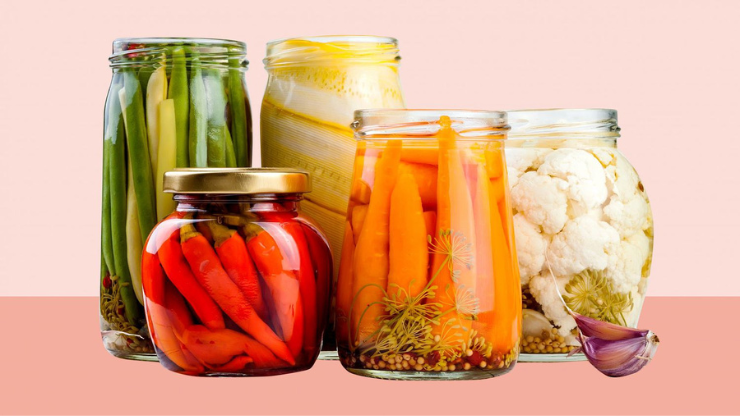In the chilly winter months, maintaining our health and well-being is of utmost importance. Winter brings with it a tendency to indulge in hearty, often less healthy comfort foods, and the body’s natural detoxification processes may slow down due to the cold weather.
To counteract this and ensure a vibrant and robust winter season, we can turn to the power of fermented foods. These foods have been valued for their ability to promote digestive health, boost immunity, and aid in detoxification.
In this guide, we will explore the synergy between fermented foods and winter detoxification. We’ll delve into the science behind fermentation, the specific fermented foods that shine in the winter season, and how they contribute to the body’s detoxification processes.
Additionally, we’ll provide practical tips for incorporating these foods into your daily diet, ensuring a healthier and more revitalizing winter experience. So, let’s embark on a journey to discover the best fermented foods that can help you naturally detoxify your body during the winter months.
Table of Contents
ToggleImportance of detoxification in winter
Detoxification in winter holds particular significance for several reasons:
- Seasonal Diet Shifts: Winter often brings about dietary changes, with more indulgence in rich and heavy foods. These choices can burden the digestive system and increase the body’s toxin load. Detoxification helps counteract the effects of these dietary shifts.
- Reduced Physical Activity: Colder temperatures and shorter days can discourage outdoor physical activity, leading to a more sedentary lifestyle. This reduced activity can slow down the body’s natural detox processes, making it even more important to support detoxification through dietary means.
- Immunity Boost: The winter season is notorious for the prevalence of colds, flu, and other illnesses. Detoxification helps bolster the immune system by eliminating toxins that could weaken it, enhancing the body’s ability to defend against pathogens.
- Hydration Challenges: In winter, people often consume fewer liquids, leading to potential dehydration. Proper hydration is essential for efficient detoxification, as it supports the functions of the kidneys and other detox organs.
- Seasonal Allergies: For some individuals, winter brings a new set of allergens, such as indoor molds and dust. Effective detoxification can help alleviate the symptoms of these allergies by reducing the body’s overall toxic load.
- Emotional Well-Being: Seasonal affective disorder (SAD) and the holiday blues are common in the winter months. Detoxification can have a positive impact on mental health by helping to eliminate toxins that may contribute to mood swings and fatigue.
Also Read – Amazing Healthy Foods That Boost Energy
Best Fermented Foods for Natural Detoxification In Winters
Kimchi

Kimchi is a traditional Korean side dish made from fermented vegetables, primarily napa cabbage and radishes, seasoned with a blend of spices like garlic, ginger, and red chili flakes.
This spicy and pungent dish is a nutritional powerhouse, providing probiotics for gut health and a range of vitamins, minerals, and antioxidants.
Kimchi can aid in digestion, boost the immune system, and support natural detoxification. It’s a flavorful way to enhance your winter diet while reaping the benefits of fermentation.
Kombucha

Kombucha is a popular fermented tea beverage created by adding a culture of bacteria and yeast to sweetened tea. During fermentation, it develops a unique, slightly effervescent quality and a range of flavors. Rich in probiotics, antioxidants, and organic acids, Kombucha is known for its potential health benefits.
Consuming Kombucha can aid in improving gut health, digestion, and overall well-being. In winter, it can be a refreshing and tangy addition to your diet, supporting your immune system and potentially assisting in natural detoxification processes. Be mindful of added sugars in some commercial brands and opt for varieties with live cultures for maximum benefits.
Kefir
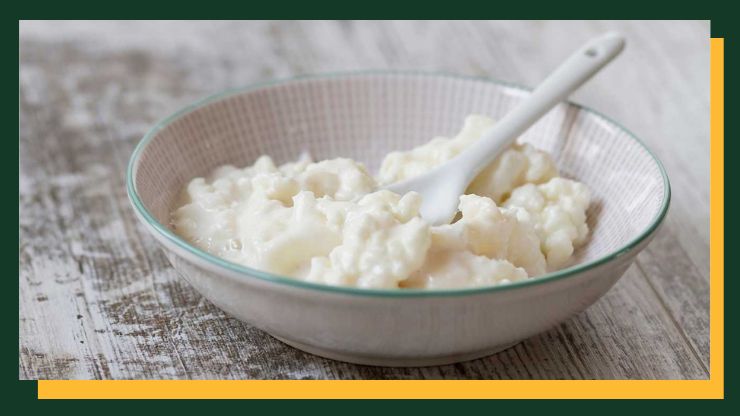
Kefir is a fermented dairy or non-dairy beverage made by introducing kefir grains (a combination of bacteria and yeast) into milk or milk alternatives. This fermentation process results in a creamy, probiotic-rich drink with a slightly tart flavor. Kefir is a nutritional powerhouse, offering a diverse range of beneficial bacteria strains that support gut health.
It’s a great source of calcium, protein, and other important nutrients. In the winter, incorporating kefir into your diet can boost your immune system and enhance digestion. Non-dairy alternatives like coconut kefir are available for those with lactose intolerance or dairy-free preferences, making it a versatile choice for many.
Miso
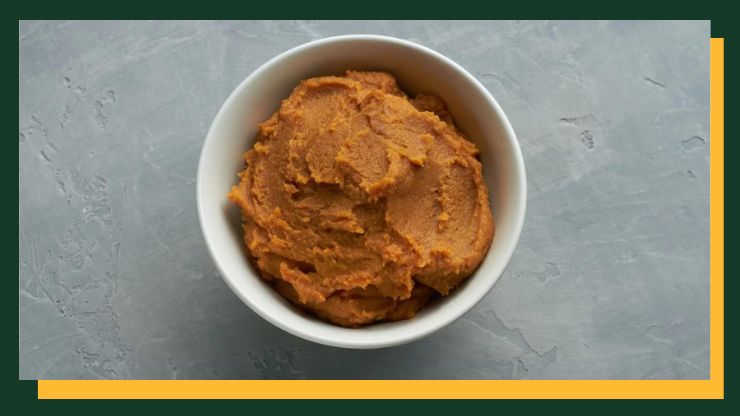
A traditional Japanese condiment, miso is prepared from fermented rice, barley, or soybeans. The fermentation process involves koji (a type of mold) and salt, resulting in a thick, flavorful paste. Miso is known for its umami-rich taste and versatility in cooking.
It’s a source of probiotics, which promote gut health, and it also contains antioxidants, vitamins, and minerals. Adding miso to soups, stews, marinades, and dressings can enhance the flavor of your winter dishes while providing potential health benefits.
The fermentation process contributes to the formation of unique compounds that may support overall health and natural detoxification. Choose different types of miso, such as white, red, or brown, for varied flavors and nutritional profiles.
Fermented Pickles
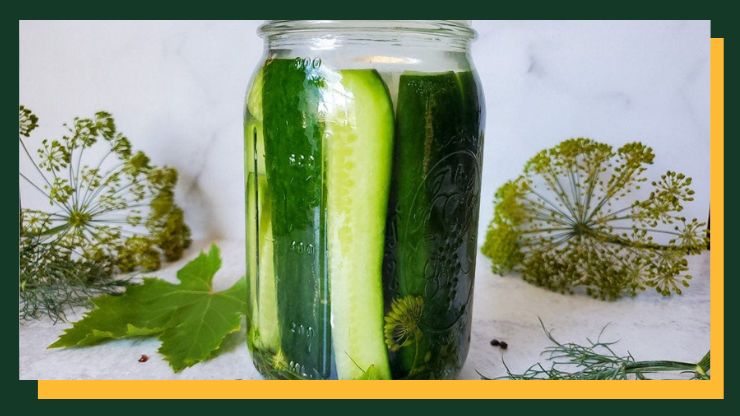
Fermented pickles, often referred to as sour pickles, are cucumbers that have been preserved through lacto-fermentation, a process that relies on beneficial bacteria to create a tangy and slightly sour flavor.
Unlike commercially processed pickles, fermented pickles are not heat-treated, ensuring that the probiotics produced during fermentation remain intact. These probiotics are beneficial for gut health and can support digestion.
Fermented pickles are a crunchy and flavorful addition to your winter diet, providing a unique taste and potential health benefits. Incorporating them into your meals or enjoying them as a snack can be a delicious way to enhance your nutrition while promoting natural detoxification.
Don't just scroll, subscribe!
BuzzTrail's unique web-stories are the cure for boredom you've been waiting for.
Yogurt

Yogurt is a creamy dairy product that results from the fermentation of milk using beneficial bacteria such as Lactobacillus bulgaricus and Streptococcus thermophilus. It’s well-known for its probiotic content, providing live and active cultures that support gut health and digestion.
Yogurt is rich in protein, calcium, and essential nutrients, making it a nutritious addition to your winter diet. Its versatility allows for various culinary uses, from breakfast parfaits to smoothies, and it can even be incorporated into savory dishes and salad dressings.
In the winter, enjoying yogurt with seasonal fruits or honey can provide a comforting and immune-boosting option while potentially aiding in natural detoxification.
Fermented Garlic
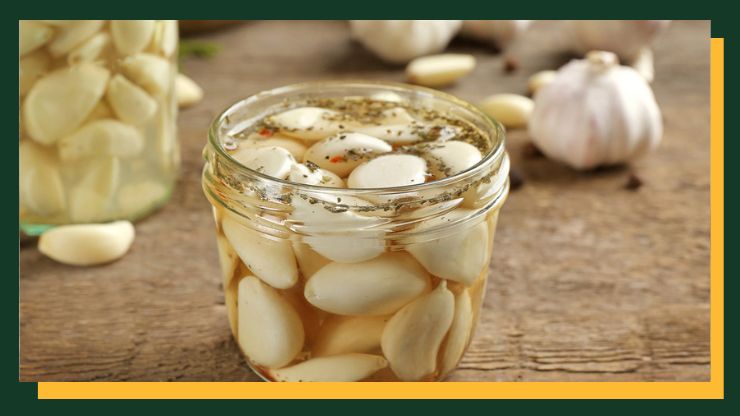
Fermented garlic is fresh garlic that has undergone a natural fermentation process, which transforms its flavor and enhances its nutritional properties. During fermentation, garlic cloves are soaked in a brine solution, leading to the growth of beneficial bacteria that release enzymes, break down the cloves, and develop a milder and more complex taste.
Fermented garlic is not only a delicious and versatile ingredient in cooking, but it also offers potential health benefits. It retains the inherent health properties of garlic, such as its antimicrobial and antioxidant characteristics, while introducing probiotics that can promote gut health.
In winter, adding fermented garlic to your dishes can boost flavor and potentially support your immune system and detoxification processes.
Fermented Beet Kvass

Fermented beet kvass is a traditional Eastern European beverage made by fermenting beets in a brine solution. The fermentation process results in a vibrant, earthy, and slightly tangy drink that is both flavorful and nutrient-rich. Beet kvass is teeming with probiotics, vitamins, and minerals, making it a nutritious choice for winter.
It supports gut health, digestion, and may assist in detoxification. Additionally, beets are known for their potential to help cleanse the liver and support the body’s natural detoxification processes.
Consuming beet kvass can provide a refreshing and health-promoting alternative to sugary drinks, and it’s often enjoyed in small quantities as a tonic or used as a base for various culinary creations.
Fermented Ginger and Turmeric
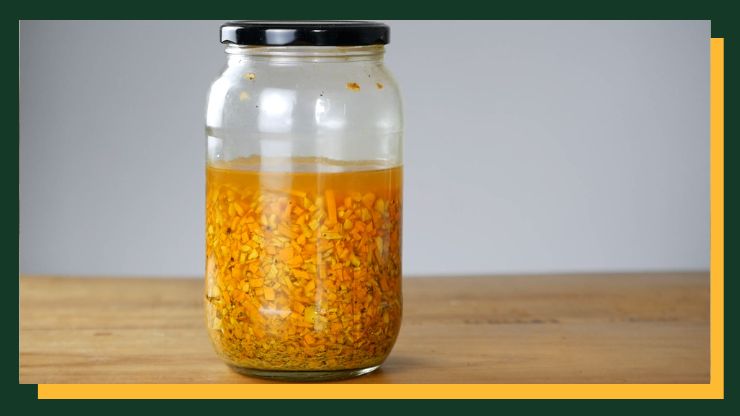
Fermented ginger and turmeric is a potent tonic made by fermenting fresh ginger and turmeric roots. This process enhances their natural flavors and unlocks the health-boosting properties of these superfoods.
The fermentation introduces beneficial probiotics that support gut health and overall well-being. Ginger and turmeric are known for their anti-inflammatory and antioxidant properties, and fermentation can make these compounds more bioavailable.
This dynamic duo can help with digestion, reduce inflammation, and potentially aid in natural detoxification. In the winter, consuming fermented ginger and turmeric can be a warming and immune-boosting addition to your diet. It’s commonly enjoyed in small quantities as a shot or diluted with water or other liquids.
Also Read – Are Pickles Bad for High Blood Pressure
Sauerkraut
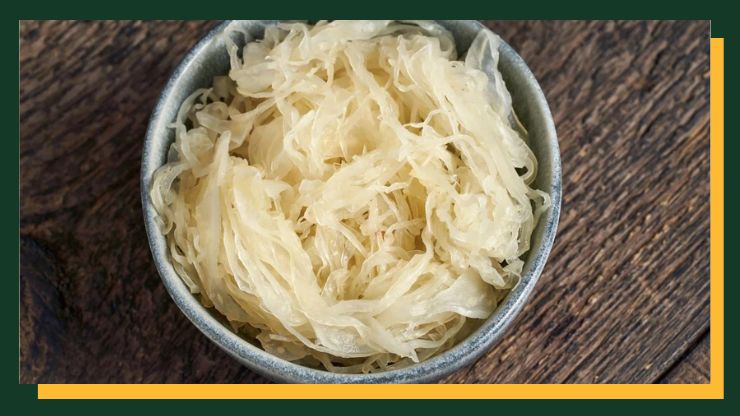
Sauerkraut is a traditional German dish made by fermenting finely shredded cabbage with salt. During fermentation, beneficial bacteria, primarily Lactobacillus, transform the cabbage into a tangy, crunchy condiment.
Rich in probiotics, sauerkraut is a gut-friendly food that can support digestion and overall well-being. In winter, it serves as a versatile and healthy addition to your diet. The probiotics present in sauerkraut can help boost your immune system, while the natural fermentation process retains the nutritional value of the cabbage, including vitamins and fiber.
Incorporating sauerkraut into your meals or enjoying it as a side can add a zesty and nutritious dimension to your winter cuisine. Opt for unpasteurized varieties to ensure probiotics are preserved.
Conclusion
In conclusion, embracing the power of fermented foods as a natural detoxification strategy during winter can be transformative for your health and well-being. The ability of these foods to support your body’s detox processes, bolster your immune system, and counteract the challenges of the season is a valuable tool for a vibrant winter experience.
By incorporating these nourishing choices into your daily routine, you can optimize your health, stay energized, and ensure a revitalizing winter season filled with robust well-being. Make the most of this winter by embracing the benefits of fermented foods and prioritizing your natural detoxification.
FAQs
What are fermented foods, and how do they aid in detoxification during winter?
What are fermented foods, and how do they aid in detoxification during winter?
Fermented foods are foods that have undergone a natural fermentation process, where beneficial microorganisms transform the food’s properties. They aid in detoxification by promoting gut health and supplying probiotics that support the body’s natural detox processes.
Which fermented foods are best for winter detoxification?
Which fermented foods are best for winter detoxification?
Some of the best fermented foods for winter detoxification include kimchi, sauerkraut, kombucha, yogurt, kefir, and fermented pickles.
How do fermented foods enhance gut health in winter?
How do fermented foods enhance gut health in winter?
Fermented foods are rich in probiotics, which populate the gut with beneficial bacteria. This helps improve digestion, nutrient absorption, and overall gut health, which is essential for detoxification.

